Chinese outlets and diplomats engage in whataboutism as Canada and other western countries turn up the pressure on Xinjiang
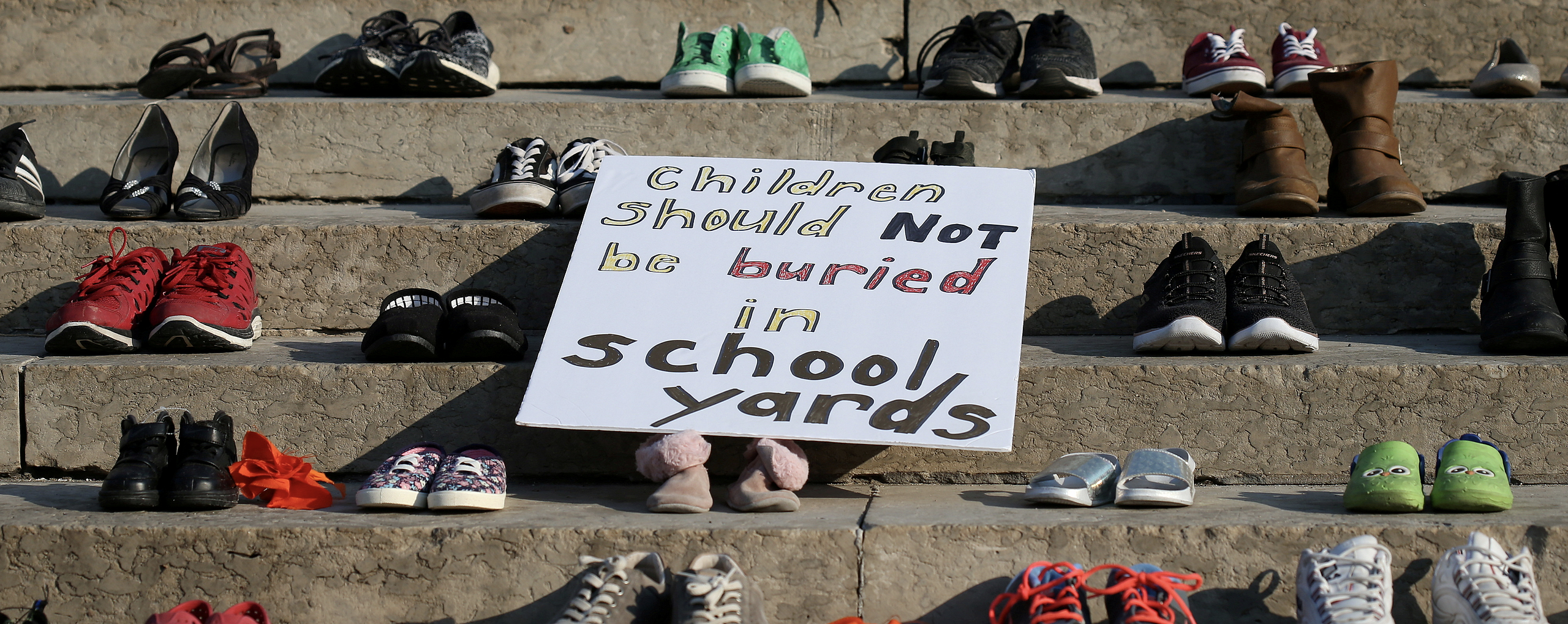
By Hans Hanley
As Canada undergoes a national reckoning surrounding the discovery of hundreds of unmarked graves at schools that were used to forcefully assimilate indigenous children, the discoveries have been weaponized by Chinese state media and officials. They have seized upon the opportunity to pillory Canadian society and the West in attempts to shift focus from the ongoing repression of Uighurs in Xinjiang, which the Canadian and United States governments have officially recognized as genocide.
Across Twitter, Chinese officials including diplomats Zhao Lijian and Hua Chunying have hammered Canada’s human rights record, condemning Canada’s attempt to push further investigations into Xinjiang. Various Chinese state-run media sites including China Daily, China Global Television Network, Global Times, Xinhua, China Central Television, China News Service, and The People’s Daily have further hammered Canada, challenging the country’s lack of moral standing across a litany of nearly 90 different articles.
Background
From the 1880s to the 1990s, Canadian government-funded residential schools attempted to assimilate at least 150,000 children from Canada’s indigenous population into the Canadian society. Children were forcibly removed from their parents and forced to adopt English and Christianity; many were brutalized by physical, emotional, and sexual violence, along with neglectful healthcare and living standards. By 2008, the Canadian National Truth and Reconciliation Commission had labeled the residential school system “Cultural Genocide.”
Since late May 2021, more than 1,100 unmarked graves have been found at the sites of four former Canadian residential schools for indigenous children. The recent discoveries have caused an upheaval in Canadian society, with protests sweeping across the country and calls were made for Canada Day, the annual July 1 celebration that marks the country’s founding in 1867, to be called off.
Chinese coverage of Canadian residential schools
According to a review by the DFRLab, Chinese state-run media have pushed heavily to indict Canada’s government and society for the genocide of indigenous people. Many of the articles published on these sites were then further publicized and broadcasted by Chinese diplomats and officials. Similarly, numerous articles quoted these same officials, creating a self-perpetuating cycle of narrative promotion.
The first article targeting Canada came on May 31, 2021 from China Daily, following the initial discovery in Canada of 215 unmarked graves at a former residential school in Kamloops, British Colombia. “Some Western countries, Canada included, like to preach to other countries about human rights affairs,” the article stated. “They should review their pasts and correct their own wrongdoings, instead of pointing fingers at others.” Another article critical of Canada soon appeared in Global Times. These two articles were further broadcasted by the China state-affiliated news organization China Plus News.
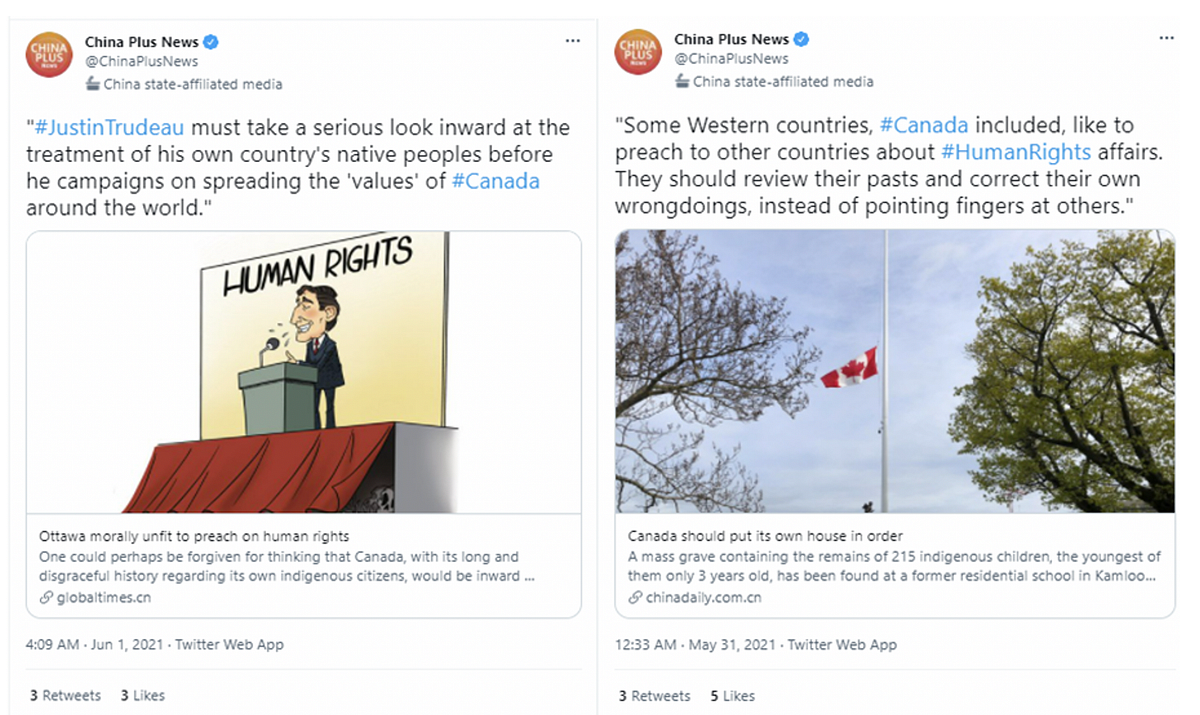
Foreign Ministry spokesman and Twitter provocateur Zhao Lijian further echoed these sentiments later that week, tweeting: “Some Western media focus so much of fake news about Xinjiang, yet keep silent about the real genocide in Canada. Politics shouldn’t override human rights.”
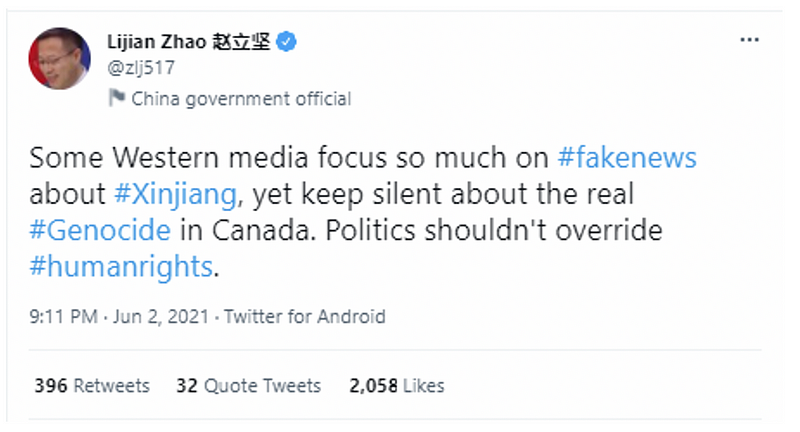
The reaction to the “Joint Statement on Human Rights Situation in Xinjiang”
However, the initial push reached a critical turning point after Canada began to lead the international coalition at the UN calling on China to permit free access for investigators into Xinjiang. On June 17, both Zhao Lijian and the Chinese Foreign Ministry condemned the resolution, criticizing the ostensible hypocrisy in Canada’s actions.
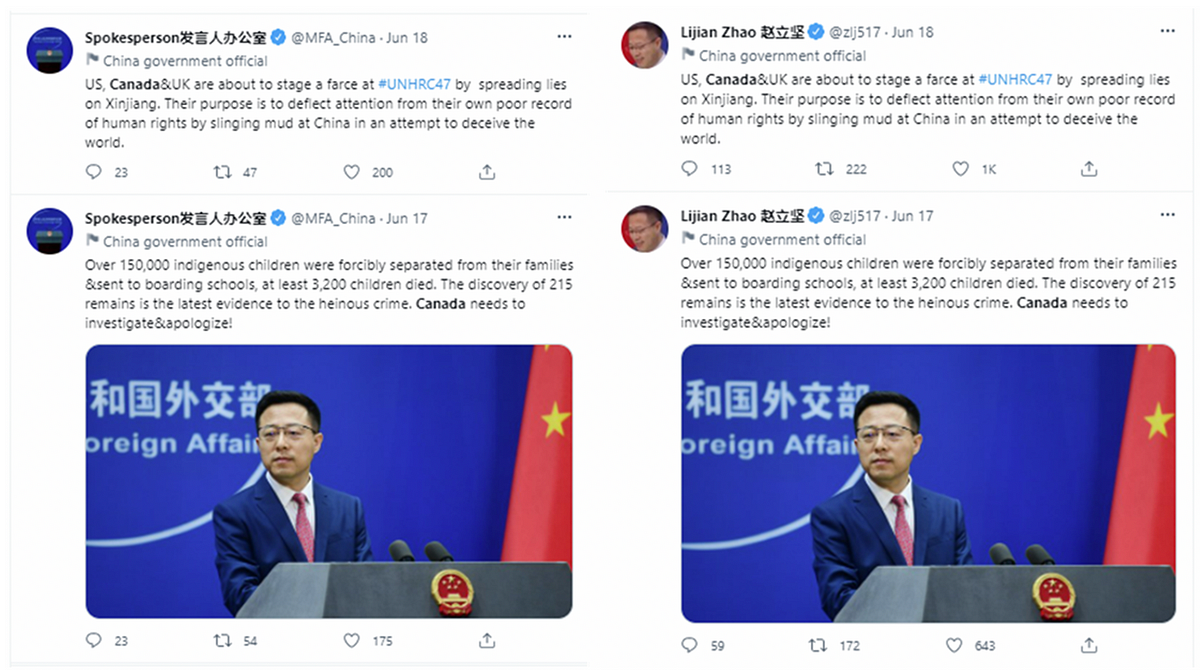
By June 22, 2021, after 44 countries signed the joint statement on the human rights situation in Xinjiang and 751 additional graves were found in Canada, Chinese officials on Twitter and state-run media sites began a renewed effort aimed at the Canadian government. Various Chinese officials ranging from Zhao Lijian and Hua Chunying to the Chinese Ambassador to Belgium and the Consul General in Brazil were soon all condemning Canada.
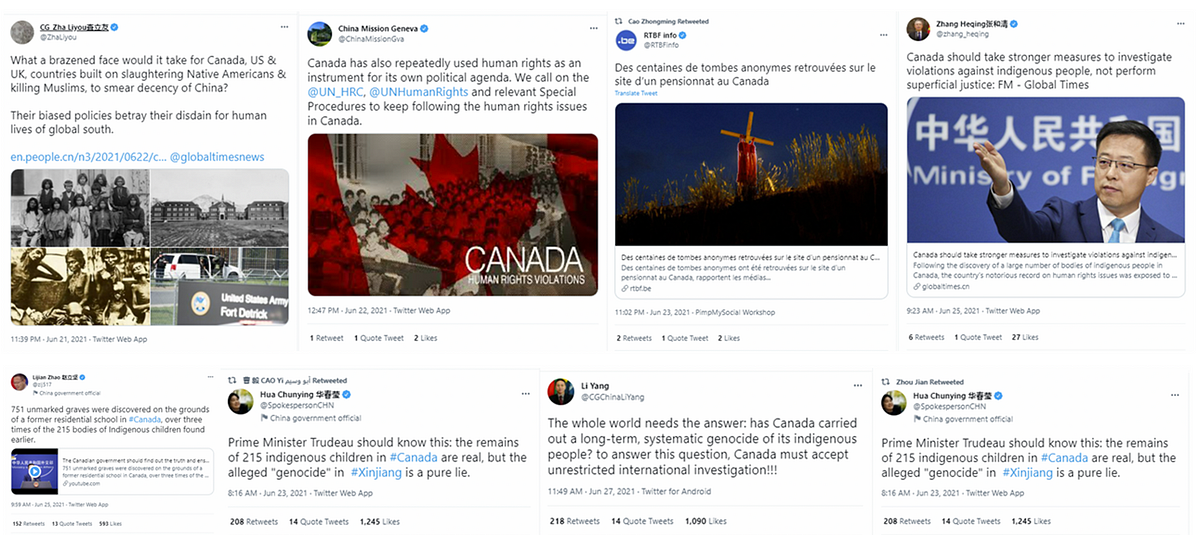
Many different Chinese news outlets also soon began to publish a host of pieces condemning Canada. Simultaneously, these same pieces questioned Canadian and Western accusations of wrongdoing in Xinjiang. For example, from June 18 until July 11th, China Daily published another 23 articles concerning the Canadian residential schools; China Global Television Network published 21; and Global Times and Xin Hua Net released 11 apiece. Meanwhile, CCTV, China News Service, and People’s Daily accounted for another 19 articles. A full list of these articles can be found on Github.
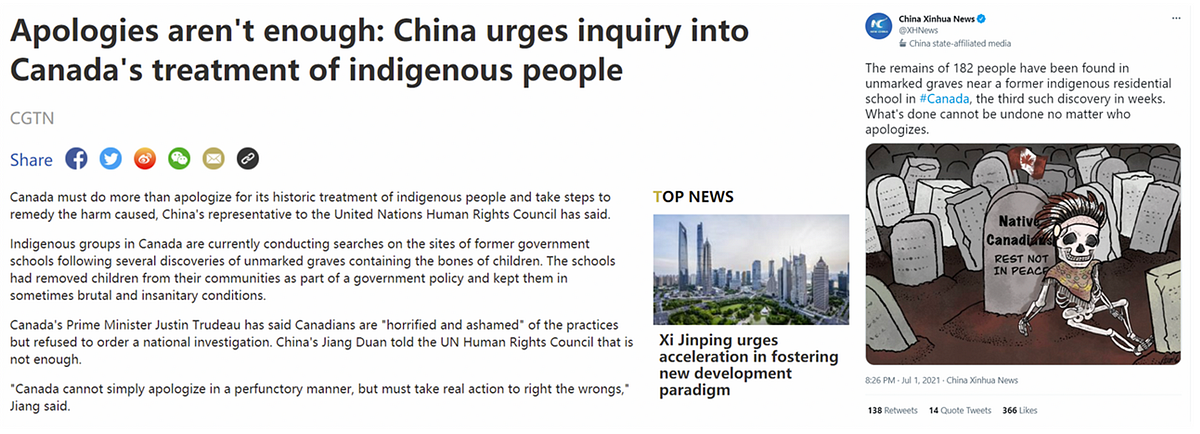
Many of the articles that were published in the Chinese state-run media were then subsequently promoted by government officials on Twitter. This had the effect of further elevating the profile of these dozens of articles that condemned Canada. Across 24 different state-affiliated accounts, Canada was referenced in more than 270 tweets in June 2021. This compares to only 146 mentions of the United States over the same time period.
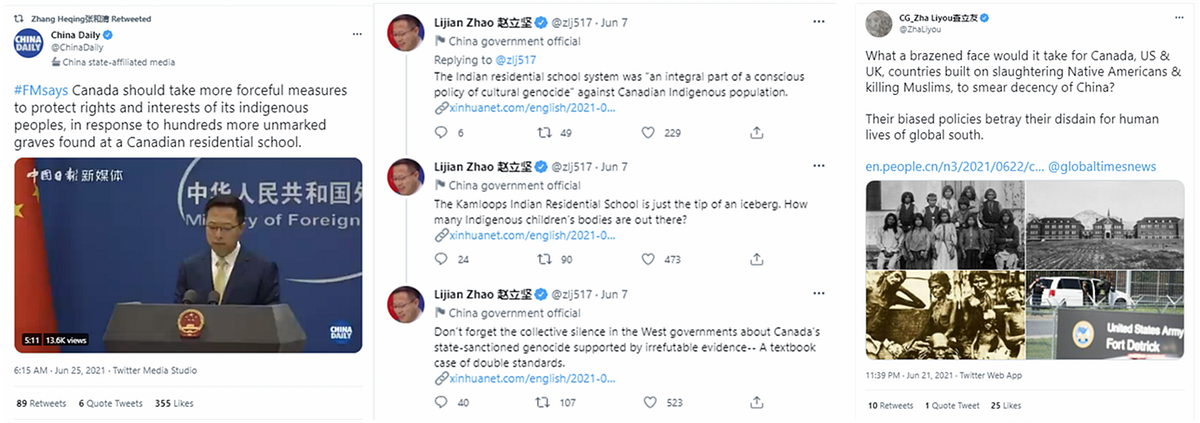
Likewise, many of these articles featured statements by various Chinese officials who had been tweeting about the matter, creating a promotional narrative loop.
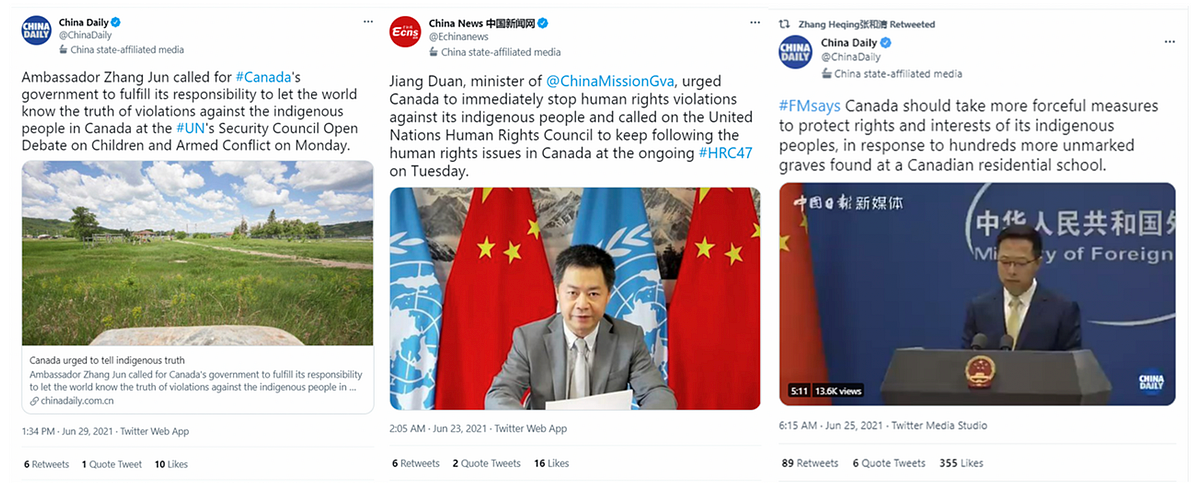
On June 28, the Chinese government formally called for a full investigation of the genocide of indigenous peoples within the United States and Canada. At the 47th session of the UN Human Rights Council, Chinese minister Jiang Duan stated, “In Canada, over 150,000 indigenous children were forcibly sent to residential schools for assimilation, and at least 3,200 were abused to death. This is only the tip of the iceberg in the number of indigenous people who died of genocide in Canada.” Chinese condemnation of Canada has continued into July 2021, with various articles being published nearly every day across Chinese media.
The continued probing of genocide in Xinjiang has worsened Chinese relations with many Western countries, Canada included. This makes it unsurprising that the Chinese government would engage in efforts to change the conversation, in this case by questioning the moral authority of Canada given the ongoing discoveries of unmarked graves at former residential schools. And while Chinese authorities and state-run media are in sync with each other in terms of their messaging, the messages themselves are an exercise in whataboutism, trying to turn the public eye away from Xinjiang towards Kamloops and other former Canadian residential schools. In doing so, though, they ignore a key difference: while Canada attempts to come to terms with and make amends for its ugly past, China refuses to acknowledge the realities of its ugly present in Xinjiang and its ongoing culpability in how it oppresses the local Uighur population there.
Hans Hanley is a research intern with the Digital Forensic Research Lab.
Cite this case study:
Hans Hanley, “China weaponizes discovery of graves at Canadian residential schools to avoid Xinjiang criticism,” Digital Forensic Research Lab (DFRLab), July 21, 2021, https://medium.com/dfrlab/china-weaponizes-discovery-of-graves-at-canadian-residential-schools-to-avoid-xinjiang-criticism-6bf618a6e954.
Follow along for more in-depth analysis from our #DigitalSherlocks.

